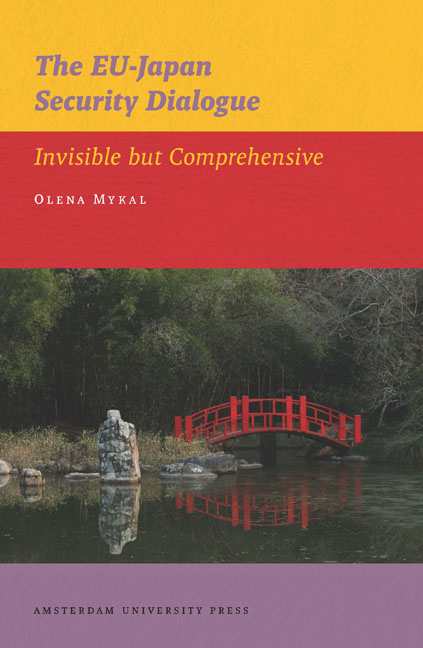Book contents
- Frontmatter
- Dedication
- Contents
- Abbreviations
- Acknowledgements
- Preface
- Introduction
- PART ONE DEVELOPING CONCEPTIONS OF SECURITY AND JOINT AGENDA OF THE EU-JAPAN SECURITY DIALOGUE
- PART TWO COMMON INTERESTS IN THE EU-JAPAN SECURITY DIALOGUE: ANALYSIS OF JOINT ACTIVITIES
- Conclusion
- About the Author
- Notes
- Bibliography
- Index
- Publications Series
6 - Ensuring Peace and Stability by Economic Means: Development Aid in the EU-Japan Security Dialogue
Published online by Cambridge University Press: 22 January 2021
- Frontmatter
- Dedication
- Contents
- Abbreviations
- Acknowledgements
- Preface
- Introduction
- PART ONE DEVELOPING CONCEPTIONS OF SECURITY AND JOINT AGENDA OF THE EU-JAPAN SECURITY DIALOGUE
- PART TWO COMMON INTERESTS IN THE EU-JAPAN SECURITY DIALOGUE: ANALYSIS OF JOINT ACTIVITIES
- Conclusion
- About the Author
- Notes
- Bibliography
- Index
- Publications Series
Summary
Japan was for a decade the largest provider of ODA in the world. In the early 21st century, it started cutting its assistance budget due to economic difficulties, and the US reassumed its top position. In 2005, the European Commission accounted for more than 8% of the world ODA and Japan's contribution reached 11%. At the same time, the EU (European Commission and member states) granted US$ 65 billion of ODA, which accounted for 56% of the world ODA. The EU and Japan together accounted for around 67% of world development aid.
The European Commission and Japan have been involved in development policies since the late 1950s. Japan began to provide assistance in 1956 when it joined the Colombo plan, and the EC started to provide aid upon its inception in 1957. Nowadays both are global donors whose assistance has a global scale, but unfortunately despite their contributions the problems in the world have not disappeared.
Chapter 1 demonstrated that in the 1980s the European Community and Japan discussed joint financing of aid development projects. Since then, the necessity to coordinate and cooperate in the aid development area has been repeatedly stated at EU-Japan bilateral summits. Moreover, during the Cold War period Europe and Japan were already corresponding and developing comprehensive ‘civilian’ security conceptualisations in which the development aid component was considered a tool for providing human security ‘for the benefit of all’. They also share an interest in better cooperation in this area, especially since 9/11, inasmuch as poverty is linked to insecurity and thus increased possibilities of terrorism.
This chapter will thus focus on Japan and the EU's concrete joint activities involving the distribution and management of development aid around the world. In other words, it will demonstrate what development aid activity areas the EU and Japan have been engaged in throughout the years since their earliest cooperation in the 1980s.
The chapter argues that there has been a security dialogue between the EU and Japan in development aid which, despite a lack of visibility, is expanding and diversifying. Moreover, because development aid is commonly perceived as an economic tool to assist developing countries, we will demonstrate that the EU-Japan development aid dialogue has been securitised, in that it provides security for both Japanese and European societies.
- Type
- Chapter
- Information
- The EU-Japan Security DialogueInvisible but Comprehensive, pp. 157 - 174Publisher: Amsterdam University PressPrint publication year: 2012



